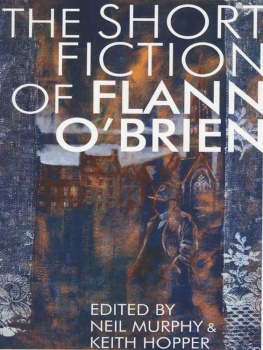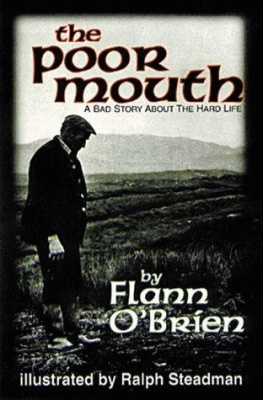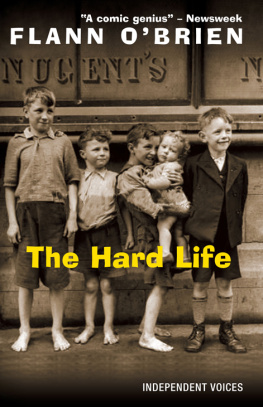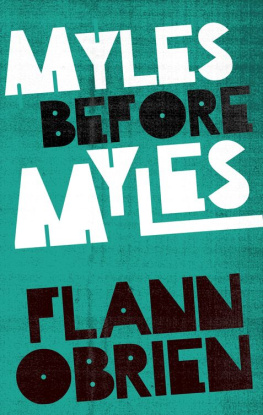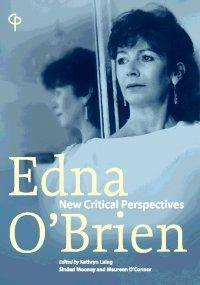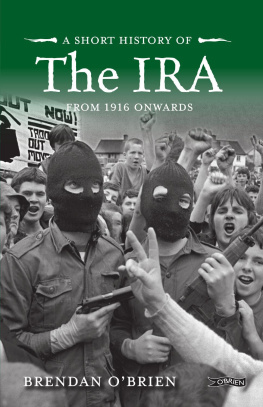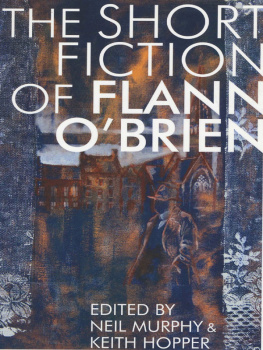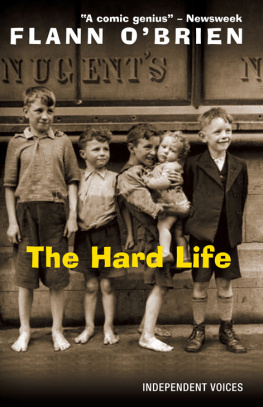OBrien Flann - The short fiction of Flann OBrien
Here you can read online OBrien Flann - The short fiction of Flann OBrien full text of the book (entire story) in english for free. Download pdf and epub, get meaning, cover and reviews about this ebook. City: Champaign;Ill, year: 2013, publisher: Dalkey Archive Press, genre: Detective and thriller. Description of the work, (preface) as well as reviews are available. Best literature library LitArk.com created for fans of good reading and offers a wide selection of genres:
Romance novel
Science fiction
Adventure
Detective
Science
History
Home and family
Prose
Art
Politics
Computer
Non-fiction
Religion
Business
Children
Humor
Choose a favorite category and find really read worthwhile books. Enjoy immersion in the world of imagination, feel the emotions of the characters or learn something new for yourself, make an fascinating discovery.
- Book:The short fiction of Flann OBrien
- Author:
- Publisher:Dalkey Archive Press
- Genre:
- Year:2013
- City:Champaign;Ill
- Rating:3 / 5
- Favourites:Add to favourites
- Your mark:
- 60
- 1
- 2
- 3
- 4
- 5
The short fiction of Flann OBrien: summary, description and annotation
We offer to read an annotation, description, summary or preface (depends on what the author of the book "The short fiction of Flann OBrien" wrote himself). If you haven't found the necessary information about the book — write in the comments, we will try to find it.
The short fiction of Flann OBrien — read online for free the complete book (whole text) full work
Below is the text of the book, divided by pages. System saving the place of the last page read, allows you to conveniently read the book "The short fiction of Flann OBrien" online for free, without having to search again every time where you left off. Put a bookmark, and you can go to the page where you finished reading at any time.
Font size:
Interval:
Bookmark:
Other Works by Flann OBrien
NOVELS
The Poor Mouth
At Swim-Two-Birds
The Third Policeman
The Hard Life
The Dalkey Archive
COLLECTIONS
The Best of Myles
Further Cuttings from Cruiskeen Lawn
At War
Flann OBrien: Plays and Teleplays
THE SHORT FICTION OF FLANN OBRIEN
Edited by Neil Murphy and Keith Hopper, with translations from the Irish by Jack Fennell

DALKEY ARCHIVE PRESS
CHAMPAIGN / LONDON / DUBLIN
Contents
Introduction:
The Invisible Author
Strictly speaking, this story should not be written or told at all. To write it or to tell it is to spoil it. This is because the man who had the strange experience we are going to talk about never mentioned it to anybody, and the fact that he kept his secret and sealed it up completely in his memory is the whole point of the story. Thus we must admit that handicap at the beginningthat it is absurd for us to tell the story, absurd for anybody to listen to it and unthinkable that anybody should believe it.
Flann OBrien, John Duffys Brother, 1940
Throughout his career, the concept of the invisible author remained at the heart of Brian ONolans (post-)modernist aestheticor as Myles na Gopaleen magisterially declared in 1964: Compartmentation of personality for the purpose of literary utterance ensures that the fundamental individual will not be credited with a certain way of thinking and fixed attitudes. No author should write under his own name nor under one permanent pen name. For scholars, though, this principle of pseudonymity has become something of a bibliographical minefield: ONolan claimed to have written under a whole host of pen names, not all of which have been discovered or confirmed. This present collection includes work from several of these known pseudonyms, and proposes consideration of at least one new one. In Irish (Gaelic), our shadowy author writes under Brian Nuallin, while in English he splits into many personas, including Brother Barnabas, Flann OBrien, Myles na gCopaleen, Myles na Gopaleen, Lir OConnor, and, eventually, Brian Nolan and Brian ONolan. In an appendix to this volume, we have also included a story by John Shamus ODonnell, another possible nom de plume; this is accompanied by an invitation to Flanneurs to further investigate its likely authenticity as a work attributable to Flann OBrien.
For the purposes of consistency we retain the name Flann OBrien for general comment, although the original pen names remain at the head of each individual entry. Because our selections are drawn from several periods and sources (newspapers, magazines, journals, anthologies, and archives), they speak to a range of the larger works and yet simultaneously ask to be considered in their own terms, thereby opening up new alleyways and backstreets of discovery for OBrien aficionados. Far from fragmenting the voice of Flann OBrien, the sheer multiplicity of pseudonymsand the many posthumous, nameless, and playfully satirical narratorsultimately act as a cohesive but dissonant statement that implicitly refutes the idea of a singular and authoritative centre of meaning. For OBrien as much as Roland Barthes, the death of the author is the birth of the reader.
This anthology includes new translations of five Irish-language stories originally published in the early 1930s, prefaced with a brief introduction by the translator, Jack Fennell. These stories, while valuable in their own right, have interesting parallels with the early stories in English, and with the major novels which followed a few years later. The Tale of Black Peter (Aistear Peadar Dubh), and Revenge on the English in the Year 2032! (Doghaltais ar Ghallaibh sa Bhliain 2032!), for instance, resonate strongly with the satire of Irish cultural politics that we later find in An Bal Bocht (first published in 1941; translated as The Poor Mouth in 1973). Similarly, The Arrival and Departure of John Bull (Teacht agus Imtheacht Shein Bhuidhe) includes a scathingly parodic treatment of Irish myth and legend, which gives advance notice of Flann OBriens novelistic fascination with textuality and temporal play.
The same fascination with self-reflexive framing is evident in the English-language story Scenes in a Novel, although the subject-matter is less obviously fixated on Irish culture. This early story from 1934 shows the nascent stirrings of some of the artistic processes that OBrien would later explore in At Swim-Two-Birds (1939), including the principle of aestho-autogamy and the character revolt against the despotic author. Scenes in a Novel also features the mischievous use of mock footnotesindeed, the whole incident reminded me forcibly of Carruthers McDaidand it inaugurates that most unreliable of narrative voices, the mordant storyteller who is probably posthumous. Both of these elements, of course, prefigure the darkly comic machinations of The Third Policeman (completed in 1940; first published in 1967), which is increasingly regarded as OBriens masterpiece.
Thus, several years in advance of his most important novels, many of OBriens metafictional ideas had already emerged in embryonic form. This deconstructive playfulness is still evident in the early 1940s: When I Met William of Orange (1942) presents itself as a Footnote to the Battle of the Boyne, while Im Telling You No Lie! (1943) purports to offer Some leaves from the authors salad days. (Both of these stories, first published in the Irish Digest, are reprinted here for the first time.) In addition, stories such as John Duffys Brother (1940) and Two in One (1954) could be considered as useful companion pieces to OBriens novels, but with their shape-shifting themes and absurdist techniques they also stand out as important examples of early postmodern fiction in their own right. Moreover, some of the later stories, such as The Martyrs Crown (1950) and Donabate (1952), offer fascinating insights into the interregnum between the two periods of OBriens novelistic output, i.e., between the exuberant novels of the early 1940s and the late, unexpected reprise in the early 1960s, which saw the publication of The Hard Life (1961) and The Dalkey Archive (1964). In these later stories and novels there is undoubtedly a shift in his aesthetic towards something slightly more realist, although the satirical focus remains consistent throughout. This contrarian impulse is still very much in evidence in his final unfinished novel, Slatterys Sago Saga (c.196466), which is included in the third section of this volume.
Overall, this anthology gathers together previously unavailable or dispersed material under one reader-friendly roof. However, given the multiplicity of names that OBrien used (or is reputed to have used), this is by no means a definitive collection. Instead, we offer it up as an initial act of recovery rather than a completist project. Even so, it is clear to us that several of these stories deserve proper critical attention as important works within the general trajectory of international metafiction and the Irish literary tradition(s). Consequently, this volume is also an invitation to Flanneursboth seasoned and fledglingto find their own resonances and significances, not just within and between individual stories but in comparison with the more canonical novels and newspaper columns as well. In this respect, our ownpossibly controversialinclusion of John Shamus ODonnells Naval Control represents a speculative gesture designed to generate further discussion and discovery.
Neil Murphy & Keith Hopper, Singapore and Oxford, 2013
Who is Carruthers McDaid, you ask?
The stories in this collection are drawn from several periods and a variety of sources. In most cases, we have chosen to reproduce the earliest published versions available, and these base texts have been cross-checked against later versions published elsewhere. Where possible, we have also cross-checked the base texts against the original typescripts and manuscripts held at two archives: the Brian ONolan Papers, 19141966 (1/4/MSS 051), Special Collections Research Center, Morris Library, Southern Illinois University, Carbondale; and the Flann OBrien Collection, 18811991 (MS97-27), Archives and Manuscripts, John J. Burns Library, Boston College.
Next pageFont size:
Interval:
Bookmark:
Similar books «The short fiction of Flann OBrien»
Look at similar books to The short fiction of Flann OBrien. We have selected literature similar in name and meaning in the hope of providing readers with more options to find new, interesting, not yet read works.
Discussion, reviews of the book The short fiction of Flann OBrien and just readers' own opinions. Leave your comments, write what you think about the work, its meaning or the main characters. Specify what exactly you liked and what you didn't like, and why you think so.

